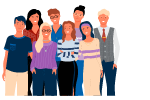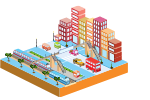The Interview | Agi Veres
 | How would you describe your organization in a few words? What is your role? What is your goal? |
UNDP is the UN’s lead development agency, on the ground in 170 countries and territories, helping people build a better life.
As a longer answer, UNDP is working to eradicate poverty and reduce inequality focusing on sustainable development, democratic governance peacebuilding, community security and social cohesion, and climate and disaster resilience. We connect countries to knowledge and resources and help them develop policies, institutional capabilities, and partnerships to achieve the Sustainable Development Goals, including a green and inclusive recovery from the COVID-19 crisis. Innovation, digitalization, and financing are underpinning our efforts – as we are looking for new and better ways for existing and anticipated challenges.
Our office in Geneva fosters cooperation with the diverse actors of International Geneva to strengthen the links between UNDP’s global development work and the Geneva pillars of peace, rights, and well-being. In other words, we are bringing development to the table of discussions of the Geneva community, focusing on development contributions to humanitarian and crisis settings, as well as the issues of human rights, health, and the environment. In return, we take back the wealth of collective knowledge of Geneva to enrich and strengthen our development work globally.
My role is to lead a multi-disciplinary team here, and leverage UNDP’s robust global capacities to help advance dialogue for policymaking, new resources (public and private), and enhance support to UNDP’s programs on the ground. We have a bold new Strategic Plan for 2022-25 and my objective is to create an environment where UNDP effectively contributes to it based on local engagement and mature partnerships.
 | Among the concentration of actors in Geneva (IOs, NGOs, permanent missions, academia, and the private sector), who do you work with and how? |
Put it simply, we work with all who share our passion to make people’s lives better in the world. It is not just an ideal, partnership is at the heart of everything UNDP does, whether it's exchanging ideas, advocating for change, co-creating policies or investing jointly in programs. Today’s challenges cannot be dealt with in isolation. Take the example of the promotion of human security: In addition to the impact of violent conflicts and pandemics that we are all sadly aware of, there is undoubtedly a broader set of threats affecting the security of individuals and communities across the world. For instance, new climate threats are already forcing millions into displacement. And the climate crisis is inseparable from the biodiversity crisis and the poverty and inequalities suffered by billions of people around the world.
To help design integrated solutions, in Geneva we work closely with the Swiss Government (one of our largest contributors) and local non-governmental partners, such as think tanks, NGOs, and universities; and of course, with the UN System, and our Member States through the 177 Permanent Missions present in the city.
As Geneva is also a financial hub of Europe, we collaborate with the finance sector to bridge the gap for investments between emerging markets and the investor community. As part of these efforts, we are a core partner of the Building Bridges Week. We also manage a bilateral relationship with France through our Geneva office.
 | What are the strengths and weaknesses of Geneva with regards to the development of your activity? |
Geneva is a global hub, yet a ‘village’ – it’s where global meets the practical, and informal conversations can lead to major policy changes. On top of it, it is set within the heart of a beautiful environment (green and blue) that reminds us daily of the importance of conserving nature.
Geneva plays an invaluable role as a platform for connecting Member States, international organizations, NGOs, and the private sector committed to a sustainable future. It is the second-largest centre for Multilateral cooperation, with 40 international organizations and over 430 NGOs, hosting close to 5000 annual events and high-level visits as well as multiple platforms for substantive exchange. This unique ecosystem fostered by the Swiss Government forms the basis for a powerful innovation ‘lab’ that can co-create development solutions. UNDP in Geneva is an active partner contributing to these different global efforts, and I see many opportunities to further leverage what International Geneva has to offer.
I don’t see any particular weakness, perhaps just the fact that the vibrant nature of International Geneva can at times be overwhelming, and the ‘tracks’ of interest can create silos of engagements.
 | What do you think global governance should look like 20 or 30 years from now? |
Our world is increasingly divided, and increasingly complex. The pace of change ‘out there’ is so much faster than the change inside governance systems and what they can keep up with. We cannot hope for sustainable development without peace, stability, human rights, and effective governance, based on the rule of law. Global governance systems must draw strength from multilateral engagements and become more inclusive. They also should become more agile, challenging conventional paradigms, and looking towards future challenges in an anticipatory manner to be able to support resilience and global stability. UNDP is promoting these principles as an active participant of the multilateral system, putting innovation and technology, as well as global financing mechanisms in the service of human development.
 | What question would you like to have been asked? |
Being a successful leader, and mother of 3 children, how do you reconcile your career and personal life?
Indeed, I often get asked the ‘how do you do it all’ question, meaning, how as a woman and a mother I manage my career and life. Geneva, in addition to having a fostering environment for our development work, also provides the privilege (and not to be taken for granted after having spent most of my recent years in developing countries!) of a safe and conducive environment with top-notch education and health services to thrive both personally and professionally. I am grateful for that, especially in the global pandemic context.
